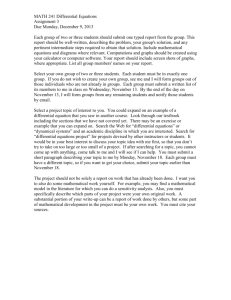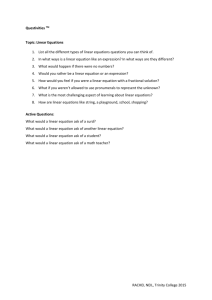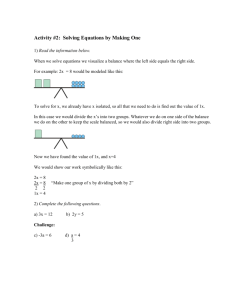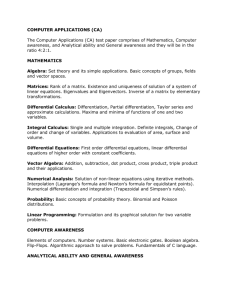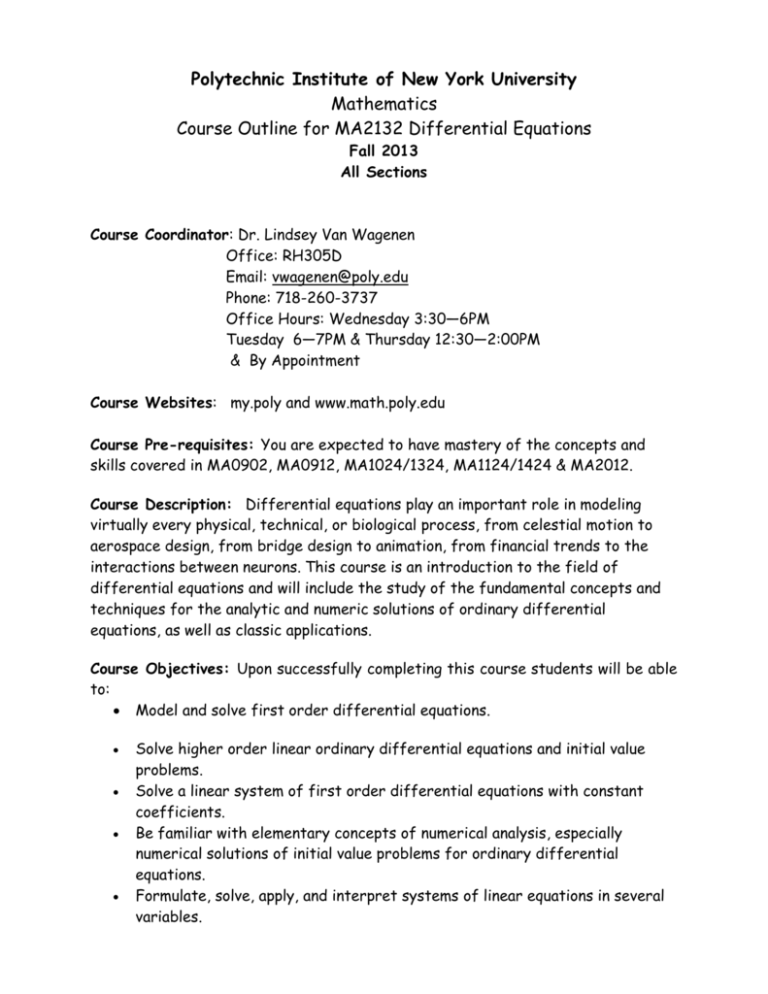
Polytechnic Institute of New York University
Mathematics
Course Outline for MA2132 Differential Equations
Fall 2013
All Sections
Course Coordinator: Dr. Lindsey Van Wagenen
Office: RH305D
Email: vwagenen@poly.edu
Phone: 718-260-3737
Office Hours: Wednesday 3:30—6PM
Tuesday 6—7PM & Thursday 12:30—2:00PM
& By Appointment
Course Websites: my.poly and www.math.poly.edu
Course Pre-requisites: You are expected to have mastery of the concepts and
skills covered in MA0902, MA0912, MA1024/1324, MA1124/1424 & MA2012.
Course Description: Differential equations play an important role in modeling
virtually every physical, technical, or biological process, from celestial motion to
aerospace design, from bridge design to animation, from financial trends to the
interactions between neurons. This course is an introduction to the field of
differential equations and will include the study of the fundamental concepts and
techniques for the analytic and numeric solutions of ordinary differential
equations, as well as classic applications.
Course Objectives: Upon successfully completing this course students will be able
to:
Model and solve first order differential equations.
Solve higher order linear ordinary differential equations and initial value
problems.
Solve a linear system of first order differential equations with constant
coefficients.
Be familiar with elementary concepts of numerical analysis, especially
numerical solutions of initial value problems for ordinary differential
equations.
Formulate, solve, apply, and interpret systems of linear equations in several
variables.
Course Structure: The 2-credit, half semester course meets for lecture twice a
week for 110 minutes each class. You are also expected to study outside of class, a
good ‘rule of thumb ‘is three hours of study for each hour of class.
Course Requirements: (The grading policy is detailed in a section below).
Twice Weekly Lecture
WebAssign Online Homework- WebAssign can be accessed from
Blackboard.
Midterm Exam Tuesday, November 19, 2013, during class time.
Final Exam As scheduled by the registrar during finals week
Examinations: One 105-minute midterm given during class time, and a 105-minute
cumulative exam scheduled during finals week (in the second half of the semester).
The only calculator permitted is the TI-30, no substitutions.
Textbook There are two suggested text books for the course, you can use either
one .
A First Course in Differential Equations by Dennis Zill We will use the 9th Edition,
as listed below—but you can use any edition you wish.
A First Course in Differential Equations by Dennis Zill Brooks/Cole/Cengage
ISBN-13:978-0-495-10824-5.
New copies of the 9th edition are on sale in the bookstore, and new and used
copies of previous editions are available online
Differential Equations and Linear Algebra 3rd edition by Stephen W. Goode and
Scott Annin Pearson/Prentice Hall ISBN: 978-0-13-045793-3
You can also purchase a used edition.
Homework
We will be using WebAsssign for the mandatory online homework.
Maple TA can be accessed from Blackboard on the MA2132 course page from the
Course Content Box at the upper left. Your grades for the homework will be visible
in the grade book. The best 90% of your cumulative homework points will count—
in other words 10% of the homework points will be dropped. Use Chrome as your
browser. WebAssign does not work well with Internet Explorer.
If you have any questions about WebAssign contact Dr. Van Wagenen at
vwagenen@poly.edu.
Grading Policy
Course Grade: Final grades will be calculated according to the rules below. The
course grade is determined by the best of your course averages using the table
below.
Average 1 Average 2
Midterm
40%
15%
Final Exam 50%
80%
Homework 10%
5%
Information about the grading scale conversion to letter grades can be found on
www.math.poly.edu.
Course Lecture Syllabus (The sections are quoted from the 9th edition of Zill
and correlated from the 3rd edition of Goode and Annin, GA)
[Lecture 1] Introduction to Differential Equations; Initial Value Problems;
Mathematical Models (GA 1.1, 1.2, 1.5)
Section 1.1
Section 1.2
Section 1.3 (Only Basic Population and Radioactive Decay Models)
[Lecture 2] Direction Fields and Solution Curves; Separable Variables;
(GA 1.3, 1.4)
Section 2.1
Section 2.2
[Lecture 3] Linear Equations; Exact Equations; (GA 1.6, 1.9)
Section 2.3
Section 2.4
[Lecture 4] Solutions by Substitutions (Bernoulli and Homogeneous); Euler’s
Method; (GA 1.8, 1.10 only simple Euler)
Section 2.5
Section 2.6
[Lecture 5] Linear Equations (continued); Reduction of Order
(GA 6.1, 6.2)
Section 4.1
Section 4.2
[Lecture 6] Homogeneous Equations; (GA 6.2)
Section 4.3 & Review
[Lecture 7] Method of Undetermined Coefficients;(GA 6.3)
Section 4.4
[Lecture 8]
Midterm Exam
[Lecture 9] Method of Variation of Parameters; Cauchy-Euler Equations
(GA 6.7, 6.8)
Section 4.6
Section 4.7
[Lecture 10] Cauchy-Euler cont; Introduction to Linear Systems
(GA 6.8, 7.1, 7.2)
Section 4.7 cont
Section 8.1
[Lecture 11] Homogeneous Linear Systems (GA 7.2, 7.3, 7.4, 7.5)
Section 8.2
[Lecture 12] Variation of Parameters for Linear Systems (GA 7.5, 7.6)
Section 8.3.2
Review
Monday May 13, 2013--Final Exam Review Room TBA
Final Examination scheduled during Finals Week
Additional Learning Resources:
General Evening Math Workshops
Days
Hours
Monday-Thursday 6PM-9PM
Location
JAB373
Room 2C
General Math Workshops
Days
Hours
Location
Friday
9AM-6PM
RH707
Saturday 10AM-2PM
RH705
Internet Resources
Math Department Website: www.math.poly.edu. This comprehensive website has
the course policies as well as old exam and practice materials for both the midterm
and final exam.
http://web.mit.edu/18.06/www/Video/video-fall-99.html
http://tutorial.math.lamar.edu/ Paul’s Online Math Notes,
Choose Class Notes and then the course you want.
www.Youtube.com There are many good DE lectures, the Khan Academy is a
favorite for many students.
Important: General Exam Policies
Valuables (especially your laptop!):
Please do not bring your laptop or any other valuable items to the exam. You are
required to leave your bags and books at the front of the exam room.
Time and Place:
It is your responsibility to consult the web site to know when and where an exam is
being held. You will not receive any special consideration for being late or missing
an exam by mistake.
Identification:
You are required to bring your Polytechnic ID to the exam. If for any reason you
are unable to do so, another photo ID, such as a driver’s license, is acceptable.
Before the Exam:
You must wait outside the exam room before the start of an exam. You must sit
only in seats where there is an exam for your course. You must not move the exam
to a different seat.
Neatness and Legibility:
You are expected to write as neatly and legibly on your exam. Your final answer
must be clearly identified (by placing a box around it). Points will be deducted if
the grader has difficulty reading or finding your answer.
Missed Exams:
If you missed an exam due to a medical reason, then University policy requires you
to provide written documentation to the Office of Student Development (JB158).
It is University policy that the Mathematics Department may not give make-up
exams without prior authorization by the Office of Student Development.
Academic Integrity:
Any incident of cheating or dishonesty will be dealt with swiftly and severely. The
University does not tolerate cheating. (There is no such thing as "a little bit of
cheating.") During an exam you are not allowed to borrow or lend a calculator;
borrowing or lending a calculator will be considered cheating.
TI-30 is the only calculator allowed! No Exceptions!




